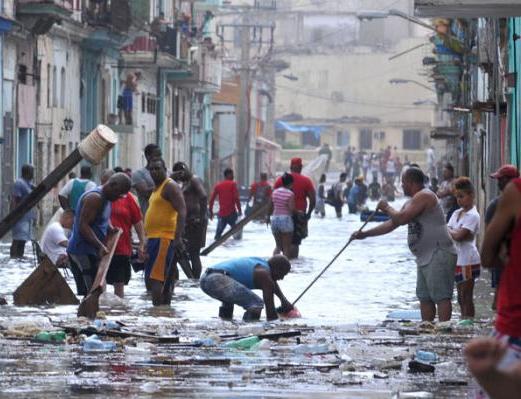
|
September 23, 2017 - No. 29 Important Matters of War and Peace U.S. President
Threatens Fire and
• Fitting
Replies to U.S. President's Threats Important Matters of War and Peace U.S. President Threatens Fire and Brimstone at UN and Trudeau Postures as World's Great White HopeThis week on September 19 General Debate began at the 72nd Session of the United Nations General Assembly in New York and will continue until September 25. At the General Assembly, Heads of State or government, or their representatives, address the United Nations stating their priorities for themselves, the world and the UN itself. A low point, exhibiting for all to see the deep crisis in which the U.S. is mired, was the performance of its President Donald Trump. His vehement rhetoric promising fire and brimstone to all non-believers in the U.S. democracy shows how desperate the United States has become because it cannot command that the world fix its economic and all-sided crisis. The more it declares that it is the indispensable nation, the more all others become aware of the need to make sure they are not dispensed with. Notwithstanding the failure of U.S. institutions to resolve the contradictions within the ruling circles or any problem in which the U.S. is mired, Trump cited the U.S. Constitution as a timeless and universal document which extends to the entire world. "We are celebrating the 230th anniversary of our beloved Constitution, the oldest constitution still in use in the world today. This timeless document has been the foundation of peace, prosperity, and freedom for the Americans and for countless millions around the globe whose own countries have found inspiration in its respect for human nature, human dignity, and the rule of law," he said. "In America, the people govern, the people rule, and the people are sovereign. I was elected not to take power, but to give power to the American people where it belongs," Trump asserted. He put forward an irrational notion of sovereignty in which the U.S. has the sovereign right to decide what is best for it and everyone else: "We must fulfill our sovereign duties to the people we faithfully represent. We must protect our nations, their interests and their futures. We must reject threats to sovereignty from the Ukraine to the South China Sea. We must uphold respect for law, respect for borders, and respect for culture, and the peaceful engagement these allow." He attacked Iran threatening to scrap the deal negotiated in 2015 between Iran, all Security Council members plus Germany, as well as the European Union, to limit its peaceful nuclear energy program in return for the dropping of sanctions. "We cannot let a murderous regime continue these destabilizing activities while building dangerous missiles, and we cannot abide by an agreement if it provides cover for the eventual construction of a nuclear program. The Iran deal was one of the worst and most one-sided transactions the United States has ever entered into. Frankly, that deal is an embarrassment to the United States, and I don't think you've heard the last of it. Believe me," Trump said. Trump then threatened the entire world with the U.S. war of terror. "From now on, our security interests will dictate the length and scope of military operation, not arbitrary benchmarks and timetables set up by politicians. I have also totally changed the rules of engagement in our fight against the Taliban and other terrorist groups," Trump declared. "America stands with every person living under a brutal regime. Our respect for sovereignty is also a call for action. All people deserve a government that cares for their safety, their interests, and their well-being, including their prosperity." The fear and even terror inspired by the fire and brimstone performance of the U.S. President should not divert attention from the fact that the allegedly kinder and gentler Great White Hope serves the same private interests both governments represent. In response to Trump's threats to "totally destroy" the DPRK, Prime Minister Trudeau was silent and instead joined Trump in blaming the DPRK for the dangerous situation. He told a news conference, "I share everyone's concern over the reckless behaviour by the North Korean regime, and continue to believe that working with partners and allies in the region and around the world ... is the best way to de-escalate this situation." His answer to de-escalating this situation: allies and partners should also threaten the DPRK rather than the U.S. going it alone. To show what this means, he opened the door to officially joining the U.S. missile defence program, which is part of U.S. pre-emptive strike capabilities against other nations. "We're continuing to look at the situation," he said. "We have not changed our position at this point, but we continue to engage in thoughtful ways to ensure we're doing everything we can and we must do to keep Canadians safe," he added. At a gala reception, September 19, held by NATO's Atlantic Council on a decommissioned U.S. aircraft carrier, Trudeau received the Council's Global Citizen Award and delivered a speech -- described by the Council as a "Rallying Cry to Save the Global Order" -- that was almost identical to Trump's remarks earlier that day. "Alliances that have underpinned global security and
prosperity since 1945 are being put to the test, and the urgency
of the challenges we share in common -- climate change and drought,
income inequality, violent extremism, civil war and the mass
migrations that result -- continues to grow," Trudeau said. "Worldwide, the long-established international order is being tested. With Russia's illegal annexation of Crimea and encroachment in Ukraine, we have seen the first major territorial seizure in Europe since the Second World War" he said. This multilateral, rules-based order enforced by the UN, NATO, NORAD, and the World Trade Organization, spans both "soft and hard power," which is why, he said, Canada is also significantly boosting its defence spending. While echoing Trump's threats against the Korean people, Trudeau hypocritically called for "opposing the scourges of racism, sexism, homophobia, transphobia, ethnic and religious bigotry, neo-fascism, neo-Nazism, and the violent extremism of Daesh that confront us in 2017." "We cannot waver. It would be unconscionable to take even one step back in upholding the standards of decency of the sisterhood and brotherhood of the human family that won the day in the most painful struggles of the last century," Trudeau said. The UN has become an antiquated body which is no longer capable of upholding the international rule of law adopted in the post-WWII period. The takeover of the world by police powers in the hands of oligopolies and private interests, which will stop at nothing to make money, means that a new balance of power is required which can hold the destructive forces in check. There can be no expectation that such a power can be created within the imperialist system of states. It has to be created by humanity uniting in action in defence of its own interests.
The Time to Act Is Now!
Fitting Replies to U.S. President's Threats
Jorge Arreaza, Foreign Minister of the Bolivarian
Republic
of Venezuela, replied to Trump's speech at a September 19 press
conference: "The United States Government is in
complete violation of all the principles of the UN Charter."
Venezuela is a country of peace and no country can or has the right to
violate Venezuela's sovereignty, he said. "We do not accept threats
from President Trump, we are a
people of peace and what we want are relations of mutual respect,
not only with the United States, but with all the countries of
the world," he added. Cuba's Foreign Minister Bruno Rodríguez
responded to Trump's speech: "It was an unprecedented speech,
aggressive, dominating, openly imperialist. I was surprised by Trump's
manipulation of the issue of sovereignty for the United States,
vassalage for the rest; totally ignoring the concept of sovereign
equality that inspires the United Nations." The leader of the Democratic People's Republic of Korea
(DPRK), Kim Jong Un, responded to Trump's speech in a
September 21 statement released by the Korean Central News Agency. The
statement noted the unhelpful nature of Trump's remarks only
increases the tension on the Korean Peninsula and rejected Trump's
insults against the DPRK and his threats to "totally destroy" a
sovereign state, which go far beyond threats of regime change
or to overturn a social system. Kim stated that Trump's remarks had
only galvanized the DPRK in its present course of action, which is to
bolster its self-defence capabilities until such time as the U.S. shows
a willingness to enter into direct and genuine negotiations for peace. Referring to "the dangerous situation on the Korean Peninsula," President Yoweri Kaguta Museveni of the Republic of Uganda asked, "Who would lose if North Korea and South Korea, those kith and kin, were left alone to discuss their re-unification?" He said the Korean nation has been in existence since 1234 AD and was temporarily divided towards the end of the Second World War. He asked why this division should be allowed to be permanent and a source of dangerous tensions: "A unified Korea would be a very strong nation. Why do some actors fear strong nations in the world? Why should the Koreans themselves (North and South) allow external forces to continue to divide them?" Bolivian President Evo Morales condemned unilateral sanctions and threats of invasion made by the United States government against Venezuela. "Our region is nobody's backyard," he said and called on the U.S. to end its blockade of Cuba and provide economic reparations, and return the territory occupied by its naval base in Guantánamo to Cuba. He added that any military solution on the Korean Peninsula must be avoided and negotiations resumed. "We must fight capitalism, colonialism and imperialism," he said, adding that success in that regard would lead to equality, social justice, peace and development. "The exiting of the United States from [the nuclear agreement with Iran] would carry a high cost, meaning that subsequent to such an action by the United States of America, no one will trust America again," President Rouhani said in an interview with NBC before Trump's address to the United Nations General Assembly. Rouhani said that should the United States pull out of the nuclear agreement, Iran would consider going "back to previous activities," developing peaceful nuclear technology for energy production. "So we will never go towards production of nuclear weapons, just as in the past we never intended to go towards that path, nor did we ever. It has always been peaceful," Rouhani affirmed.
(AVN, Cubadebate, UN News, Granma, Telesur) For an Anti-War Government! Canada's Iraq War Mission Extended The Canadian Press reports that Canada's Chief of the Defence Staff Jonathan Vance is being given greater "flexibility" to decide what types of forces to deploy into the region, to a maximum of 850 military personnel. The presence of 200 special forces in Iraq has been publicly announced, as well as Canadian planes that provide refueling and reconnaissance for U.S. bombing raids. Vance's "flexibility" is actually aimed at meeting U.S. demands rather than being decided by the Canadian government. Flexibility may also mean giving Vance more powers to decide what these forces will do and under whose command. In March he told a House of Commons Committee that Canadian soldiers can shoot to kill if they determine "hostile intent" and then used weasel words to try to make this synonymous with self-defence. Aggressive actions by Canadian soldiers indicate they have already been given approval to shoot whomever they decide and then claim "hostile intent." Canada is also said to be adding a military transport aircraft to the mission, and estimates the overall cost of the new two-year mission at about $378 million. It is not specified who will use this transport aircraft or what will be transported, however this is no doubt being put at the disposal of the U.S. "We know that Canada can, has and will continue to do important work in our efforts in northern Iraq," Trudeau said. "Canada has a strong role to play as part of the international coalition against terrorism." What Trudeau fails to mention is Canadians' longstanding opposition to participating in a military mission in Iraq at the behest of the U.S. which destroyed the country in the first place. Despite the changes, Minister of Defence Harjit Sajjan
said the military would continue to operate within the confines of its
previous "advise-and-assist" mandate. This mandate has been a fraud as
Canadian troops have from the beginning been involved in direct combat
as evidenced by the gloating of Canada's Prime Minister over the
accuracy of Canadian snipers, one of whom is said to have killed
someone deemed an ISIS fighter from 3.5 km away. Meddling in the Name of "Empowering Women"Since the forces led by the Syrian government have gained the upper hand in Syria, Canada has been unable to justify openly going into Syria which it had sought to do in the past. Recently, Canada announced $45 million to fund programs in Jordan, Iraq and Lebanon, countries that neighbour Syria. This posturing and ulterior motive are further exposed when one considers the Trudeau government's refusal to provide proper infrastructure and facilities to First Nations youth in their communities or ensure that the National Inquiry into Murdered and Missing Indigenous Women fulfills the demands of Indigenous peoples and the relatives of those murdered or disappeared. The four programs Canada is funding are outlined below: Improving municipal services and social resilience: To "improve municipal services and infrastructure in Jordanian municipalities that are hosting high numbers of Syrian refugees. Delivered in partnership with the World Bank Group and Jordan's Ministry of Municipal Affairs, this funding will also help to increase women's involvement in community level decision-making, improve their access to employment and services, and help municipal governments deliver gender-inclusive programs." Improving solid waste management and income generation in host communities: "Delivered in partnership with the United Nations Development Programme and Jordan's Ministry of Municipal Affairs, this initiative will help improve the capacity and working conditions at Al-Akeidar, Jordan's second-largest landfill. This contribution will also be used to establish a community-based recycling centre which will be operated by women of the northern region of Jordan." Support for the Global Concessional Financing Facility: To "ensure that Jordan and Lebanon continue to have access to concessional-rate financing through the World Bank Group's Global Concessional Financing Facility. These low-cost loans will be used to finance public infrastructure that responds to the needs of Syrian refugees and the communities which host them." The Middle East Women's Voice and Leadership Program: "This contribution will advance gender equality and women's empowerment in Iraq, Syria, Jordan and Lebanon. The funding will strengthen the capacity of a variety of grassroots women's organizations to empower and defend the rights of women and girls."[2] Note 1. See "Training
the
Syrian
Opposition
in
the
Name
of
Empowering Women" TML Weekly,
May 28, 2016. Get Canada Out of NAFTA! Build the Independent Politics of the Working Class! Manufacturing Yes! Nation Wrecking No!
The Canadian Labour Congress (CLC) and Unifor are supporting the NAFTA renegotiations. They justify this position by claiming they are pushing to ensure workers' rights are incorporated into the main text of the new agreement, if there is to be one. Who defines those workers' rights and what they entail are not discussed nor the fact that nowadays the ruling imperialist elite trample workers' rights into the mud with impunity, and NAFTA is one of their weapons. The interests of the ruling elite who control the monopolies, global trade, NAFTA and the new CETA agreement with the European Union are diametrically opposed to the interests of the working class. How workers define their rights in practice, in the daily struggle with their employers and the state, as in the case of terms of employment, "mobility rights," the right to health and safety, security of employment, retirement, housing, etc is different from those in power at the workplace and in the state. How could it be otherwise within countries such as Canada, Mexico and the U.S. where class privilege rules. The mass media also participate in diverting Canadians from the essence of the NAFTA negotiations by hyping so-called roadblocks to reaching an agreement. In this way, the people are led to feel anxious that an agreement will not be reached for otherwise U.S. President Trump will make good on threats to terminate it.[1] A media report on September 14, quotes Canada's Foreign Affairs Minister Chrystia Freeland characterizing the negotiations in the following manner: "The tone has been extremely cordial.... It's a very friendly environment." Freeland is even quoted as saying that the lead negotiators may form a "book club." This is a deliberate attempt to trivialize the fact that the ruling imperialist elite are negotiating the fate of over 450 million people without their say and against their interests. To hide this trampling of people's rights, Freeland constantly refers to having common interests with the workers, which the participation of the CLC and Unifor in the talks is meant to confirm. Following the conclusion of negotiations in Mexico, Freeland told reporters, "All of us want to come out of this negotiation being able to say to workers in our countries, 'We have achieved a deal that will improve your standard of living'" (Emphasis added). The problem for Freeland is that the "we" she
is
referring to are the champions of attacking workers' rights in
their own countries and abroad. To serve their narrow private
interests, the monopolies and governments throughout Fortress
North America have unleashed unprecedented violations of the
rights of the working class and no amount of cheap talk about "we"
can
cover
up
this
reality.
Just
this
past
Thursday,
September
21,
thousands
of public sector workers in Nova Scotia marched
in
Halifax to denounce the provincial Liberal government for
trampling on their rights. They declared through their actions
and words that they are not part of the Freeland "we"!
The trade union centrals are doing nothing to position the Canadian working class to be an independent political force to make sure trade and all aspects of life favour the working people and not the monopolies and oligopolies who are driving the train. A powerful political movement is required at this time to end the situation that makes the working class easy prey for state-organized imposition of humiliating conditions throughout Fortress North America.
Get Canada Out of NAFTA! Note:1. The media present the following matters as "roadblocks" to a deal, or what Mexican Economy Minister Idefonso Guajardo calls "the elephants in the room": - "U.S.'s insistence on increasing the rules of origin, particularly in the automotive sector." - "Canada and the U.S. demanding that Mexico raise wages and implement stricter enforcement of labour laws." The Globe and Mail reports that Canada and the United States "want a renegotiated NAFTA pact to include penalties if Mexico tries to keep worker wages low by not living up to labour standards set by the three countries." - "U.S. trade deficit with Mexico." - "Canada and Mexico's continued rejection of the American idea of eliminating dispute resolution mechanisms." This is a reference to the U.S. calls to eliminate Chapter 19, one of the measures that deals with disputes between governments rather than between investors and states, which is contained in Chapter 11. Besides the matters above, the Mexican Economy Minister indicates that as many as 13 other chapters of the agreement would also be "tough to negotiate." Guajardo says the specific areas being focused on in this round cover matters relating to "smaller businesses, transparency and food safety." Dispute ResolutionReports indicate that the Canadian government is pushing to use the Canada-European Union Comprehensive Economic and Trade Agreement (CETA) version of the investor-state dispute resolution chapter in a new NAFTA agreement. CETA's measures are being presented by Canada as more fair, while the current Chapter 11 in NAFTA is presented as favouring the U.S. The Canadian Centre for Policy Alternatives calculates that the Canadian government has been required to pay out more than $220 million under Chapter 11 damage claims by U.S. and Mexican investors. Mexico has paid out more than U.S.$200 million but has faced fewer claims. The United States, by comparison, has not paid out any money to settle claims. However, Belgium is currently challenging the CETA
investor-state dispute resolution mechanism at the level of the
European Court of Justice (ECJ). Belgium contends the CETA mechanism
violates the freedom of EU member states to legislate, in particular in
the fields of public health and the environment, areas of great concern
for the working people of Canada as well. EURACTIV France reports that Belgium, on September 6,
referred the "dispute resolution mechanism between investors and states
in CETA" to the ECJ asking it to evaluate the
validity of CETA's arbitration procedure under European law: "The mechanism envisaged by CETA, which was supposed to favour the settlement of disputes between a state and a foreign investor, had to be re-examined for the first time upon request from France, which feared a lack of balance in the system.
"At the time of the official signing of the CETA in Brussels in October 2016, Wallonia -- Belgium's French-speaking region -- had threatened not to sign the treaty and denounced the potentially adverse effects of arbitration on the freedom of states to legislate, in particular in the fields of environment and of public health. If the signature had to take place, the legality of the arbitration procedure envisaged by the CETA had to be verified by the European Court." Canada's Foreign Minister Freeland has bragged about
forcing Wallonia to agree to submit to CETA's provisional
implementation, however this has not resolved the matter. The Canadian
government may be seeking to have this new dispute resolution mechanism
enshrined in NAFTA so as to then demand it be accepted as part of CETA
and other so-called progressive imperialist trade deals. Conflict Over Authority to Terminate
Much has been made about U.S. President Donald Trump's threats to terminate NAFTA if a deal acceptable to him is not reached by December. U.S. Secretary of Commerce Wilbur Ross has also confirmed the U.S. is seeking some automatic termination or "sunset" clause be included "to ensure the agreement can be constantly re-evaluated and improved," Canadian Manufacturing reports. "The five-year thing is a real thing that would force a systematic re-examination," Ross told a forum in Washington. "You'd have a forum for trying to fix things," he added. Canada and Mexico both oppose the idea on the basis that it would interfere with investments. Following Ross' talk, Canada's Ambassador to the United
States David MacNaughton told reporters, "One of the reasons you do [a
trade agreement] is to create an environment within which business can
make investments. [In] many of those investments people will look to 20
years', 25 years' payback. ... If you have to do it every five years,
the pricing of political risk is very high. ... If every marriage had a
five-year sunset clause on it, I think our divorce rate would be a heck
of a lot higher than it is." Mexico's Ambassador to the U.S. Gerónimo
Gutiérrez agreed with MacNaughton saying, "It would probably
have very
detrimental consequences for the business community of the United
States, Mexico and Canada.... Certainty is the key word here." Trump has continually been threatening to "tear up" NAFTA yet he does not explicitly have the power to do so. "The U.S. Constitution conveys authority to both the President and Congress in matters of foreign affairs," said Crawford. "NAFTA was enacted into law by the NAFTA Implementation Act (NIA), but the NIA is silent on the question of who has the authority to abrogate the agreement -- there is no explicit authorization within the NIA for the President to unilaterally invoke the termination clause without Congressional approval." Crawford continued, "And unless a U.S. law has a 'sunset' date of self-termination, only Congress has the authority to repeal an existing law. Should President Trump move to unilaterally withdraw without Congressional approval, the issue may be litigated before the federal courts." In addition, the ability of the U.S. President to re-negotiate NAFTA and submit it to Congress without Congress having the ability to amend the agreement -- also known as "fast-track authority" -- granted through the "Trade Promotion Authority," expires July 1, 2018. As well, U.S. mid-term elections take place November 6, 2018. In all this, Canadians are supposed to rally behind opposition to a sunset clause on the basis that it will create "uncertainty" for business. Meanwhile, the dispute really has to do with the serious conflicts in the U.S. amongst contending forces of the ruling elite and their private interests. This contention was supposed to have been resolved in favour of one section or another with the elections for President and the U.S. Congress but this system to sort out who holds power no longer works. The fight amongst the ruling oligarchs and their representatives in government and throughout the state machine is constant and becoming ever more intense. The working people throughout North America have to stay out of these fights within the ruling elite and build their own independent political movements that can put all three countries on a new pro-social direction to solve their problems and deprive the ruling imperialist elite of the power to deprive the people of their rights. For Your Information Dispute Resolution in NAFTA NAFTA contains three dispute resolution measures:
Chapter 11 addresses disputes between investors and states; Chapter 19
addresses disputes between states; and Chapter 20 addresses the
enforcement of NAFTA provisions in general. Chapter 11 According to the Government of Canada, "Chapter 11 is
the investment component of the North American Free Trade Agreement
(NAFTA) which came into force in 1994. It establishes a framework of
rules and disciplines that provides investors from NAFTA countries with
a predictable, rules-based investment climate, as well as dispute
settlement procedures which are designed to provide timely recourse to
an impartial tribunal." The NAFTA Secretariat states: [Chapter 11] establishes a mechanism for the settlement of investment disputes that assures both equal treatment among investors of the Parties to the Agreement in accordance with the principle of international reciprocity and due process before an impartial tribunal. A NAFTA investor who alleges that a host government has breached its investment obligations under Chapter 11 may, at its option, have recourse to one of the following arbitral mechanisms: - the World Bank's
International Centre for the
Settlement
of Investment Disputes (ICSID); - ICSID's Additional Facility
Rules; and - the rules of the United Nations Commission for International Trade Law (UNCITRAL Rules). Alternatively, the investor may choose the remedies available in the host country's domestic courts. An important feature of the Chapter 11 arbitral provisions is the enforceability in domestic courts of final awards by arbitration tribunals. Global Affairs lists the following cases which are active or resolved to which Canada is a Party under Chapter 11: Notices of Intent Received and Current Arbitrations - Resolute Forest Products
Inc. v. Government of Canada Previous Arbitrations to which Canada was a Party - Eli Lilly and Company v.
Government of Canada Chapter 19 The NAFTA Secretariat states: [Chapter 19] establishes a mechanism to provide an alternative to judicial review by domestic courts of final determinations in antidumping and countervailing duty cases, with review by independent binational panels. A Panel is established when a Request for Panel Review is filed with the NAFTA Secretariat by an industry asking for a review of an investigating authority's decision involving imports from a NAFTA country. Although Chapter 19 panel decisions are binding, there is one level of review of binational panel decisions that a NAFTA government may initiate in extraordinary circumstances. This is known as the Extraordinary Challenge Committee (ECC) procedure. The challenge is not an appeal of right but a safeguard to preserve the integrity of the panel process. If either government believes that a decision has been materially affected, by either a panel member having a serious conflict of interest, or the panel having departed from a fundamental rule of procedure or having exceeded its authority under the Agreement, either government may invoke review by a three-person, binational Extraordinary Challenge Committee, comprised of judges and former judges. ECC decisions, like Chapter 19 binational panel decisions, are binding as to the particular matter addressed. Chapter 20 The NAFTA Secretariat states: The dispute settlement provisions of Chapter 20 are applicable to all disputes regarding the interpretation or application of the NAFTA. The steps set out in Chapter 20 are intended to resolve disputes by agreement, if at all possible. The process begins with government-to-government (the Parties) consultations. If the dispute is not resolved, a Party may request a meeting of the NAFTA Free-Trade Commission (comprised of the Trade Ministers of the Parties). If the Commission is unable to resolve the dispute, a consulting Party may call for the establishment of a five-member arbitral panel. Chapter 20 also provides for scientific review boards which may be selected by a panel, in consultation with the disputing Party, to provide a written report on any factual issue concerning environmental, health, safety or other scientific matters to assist panels in rendering their decisions. As well, disputes relating to the following chapters may be referred to dispute settlement procedures under Chapter 20: - Chapter 7 (Agriculture and
Sanitary and Phytosanitary
Measures);
Workers' Rights Actions Against Anti-Pension Bill C-27
OttawaOn September 18, close to 100 people participated in a demonstration in front of Finance Minister Bill Morneau's office in Ottawa. The action was organized by the Ottawa Committee for Pension Security to highlight Morneau's conflict of interest in pushing anti-pension Bill C-27. The demonstrators delivered letters to Morneau's office
demanding the immediate withdrawal of Bill C-27. A letter laying
conflict of interest complaints against the Finance Minister was also
delivered to the Office of the Conflict of Interest and Ethics
Commissioner Mary Dawson. The Ottawa Committee for Pension Security vowed to continue working to stop the anti-pension bill and will be announcing further actions to demand that the Liberals do not introduce it in the House of Commons for second reading.
Toronto
|
|
TML Weekly is reproducing below a statement by Bruno Rodríguez Parrilla, Minister of Foreign Affairs of the Republic of Cuba, to a meeting held in solidarity with the countries affected by Hurricane Irma at the United Nations in New York, September 18. The meeting brought attention to the hurricane's devastation of Caribbean Island states and aimed to secure the commitments of member states to support those countries and peoples affected.
***
Mr. President of the General Assembly,
Distinguished Representatives of the Caribbean Nations,
Gentlemen of the General Secretariat,
Dear Ministers and Heads of Delegations, representatives of agencies of the United Nations System, delegates and guests,
We are deeply grateful for the convening of this meeting, at such a difficult time for the countries affected by the destructive hurricane Irma.
Cuba expresses its sincere condolences to the relatives of the deceased and to the victims, to the peoples and authorities of all the affected territories.
The hurricane hit Cuba for more than 72 hours, and particularly struck almost the entire north coast of the country. Virtually no territory of the archipelago was exempt from its effects. Despite the large number of preventive measures undertaken, we suffered the loss of 10 human lives.
It has been a really hard blow. The sectors of housing, agriculture and the electro-energetic system, among others, were seriously damaged. The fruits of years of intense work of our people were erased by hurricane Irma in a few hours.
But the hurricane did not break the spirit of resistance of Cubans. As President Raúl Castro Ruz said in his message to our people in the recovery stage: "our people are reborn with every adversity."
As has been customary throughout the Cuban Revolution, all necessary resources will be used to ensure that no one is left unprotected.
Mr. President,
I would like to seize this opportunity to express our appreciation for the many expressions of solidarity and offers of help received from numerous governments, parliaments, international organizations and the civil society.
We reiterate our solidarity and willingness to cooperate, to the extent of our modest possibilities, with the brotherly peoples and governments of the countries affected by the hurricane. In Antigua and Barbuda, there were already 54 Cuban health workers, who were joined by specialists and technicians in electricity networks after the passage of the hurricane. All of them are contributing to the country's recovery. I mention this merely to argue a call to prioritize, in mobilizing international aid, those states and territories that, due to their small size, small population and limited capacity to generate their own resources, will face the greatest challenges in recovering after hurricane Irma.
As rightly said, this fact among other events reveals the priority that addressing climate change represents for humanity, under the principles of common but differentiated responsibilities, and in particular the need for a special and differentiated treatment to small island states such as Cuba's sister nations now severely affected.
Thank you very much.
(Cubaminrex)
Website: www.cpcml.ca Email: editor@cpcml.ca
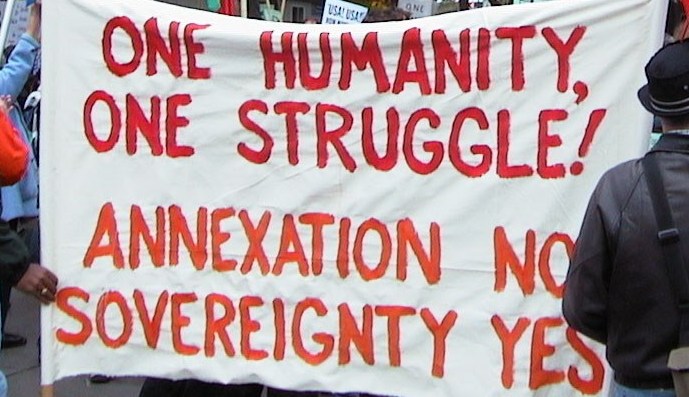
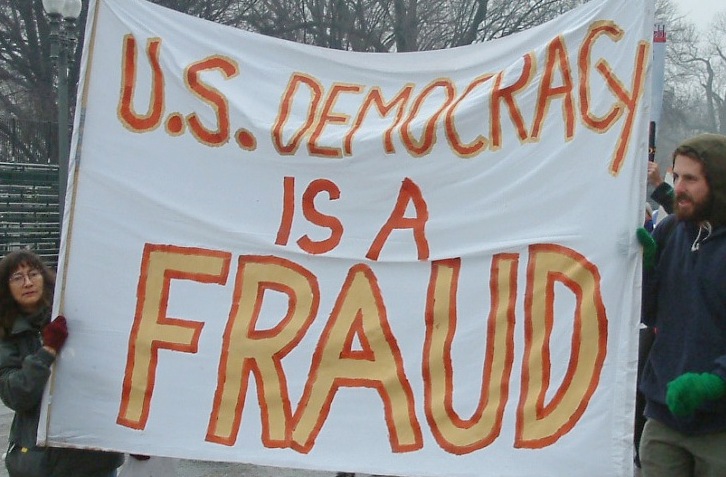 Despite the fact that the
U.S. and the failure of its
democracy are culpable for the anarchy and violence which prevail
worldwide, Trump blamed the "[a]uthority and authoritarian powers [who]
seek to collapse the
values, the systems, and alliances, that prevented conflict and
tilted the world toward freedom since World War II."
Despite the fact that the
U.S. and the failure of its
democracy are culpable for the anarchy and violence which prevail
worldwide, Trump blamed the "[a]uthority and authoritarian powers [who]
seek to collapse the
values, the systems, and alliances, that prevented conflict and
tilted the world toward freedom since World War II."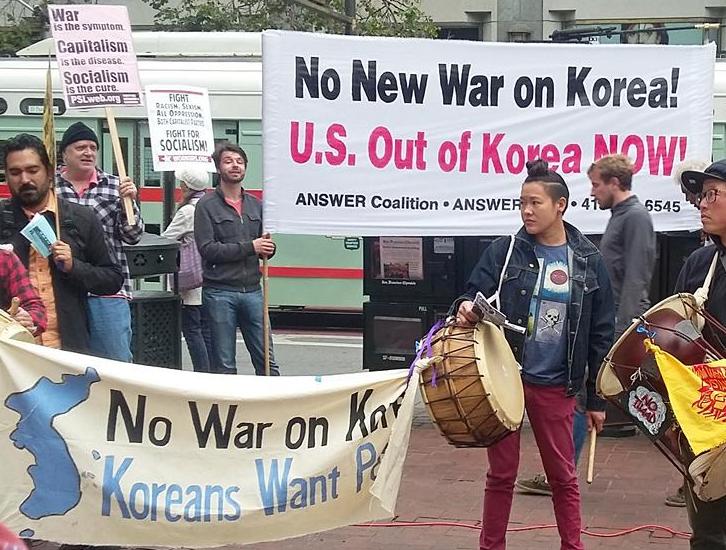 He issued a direct
threat against the Korean
people:
"The United States has great strength and patience, but if it is
forced to defend itself or its allies, we will have no choice but
to totally destroy North Korea ... the United States is ready,
willing, and able, but hopefully this will not be necessary.
That's what the United Nations is all about. That's what the
United Nations is for. Let's see how they do."
He issued a direct
threat against the Korean
people:
"The United States has great strength and patience, but if it is
forced to defend itself or its allies, we will have no choice but
to totally destroy North Korea ... the United States is ready,
willing, and able, but hopefully this will not be necessary.
That's what the United Nations is all about. That's what the
United Nations is for. Let's see how they do." For its part, the
Government of Canada used its
intervention
during the UN General Assembly to contribute to the image that its
Prime Minister is the Great White Hope who will
achieve success where those who threaten fire and brimstone do
not.
For its part, the
Government of Canada used its
intervention
during the UN General Assembly to contribute to the image that its
Prime Minister is the Great White Hope who will
achieve success where those who threaten fire and brimstone do
not.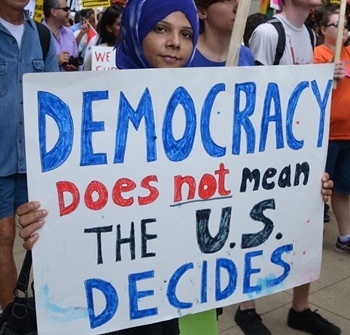 "This is not the time for
retrenchment. It is a time
for the
Atlantic democracies to renew our commitment to universal
standards of rights and liberty, enforced through a multilateral,
rules-based order that has promoted peace and stability, and
stood the test of time."
"This is not the time for
retrenchment. It is a time
for the
Atlantic democracies to renew our commitment to universal
standards of rights and liberty, enforced through a multilateral,
rules-based order that has promoted peace and stability, and
stood the test of time."
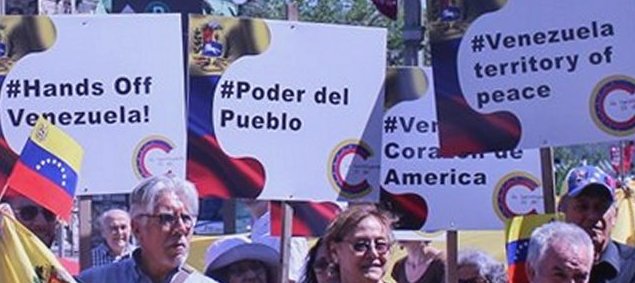
 He accused the U.S.
government and its allies in
Latin
America, Europe and elsewhere of trying to stifle and drown
the Venezuelan people with the economic measures imposed by the
White House to force a change of regime. "They want the people to
suffer, they want to create and impose a humanitarian crisis in
our country."
He accused the U.S.
government and its allies in
Latin
America, Europe and elsewhere of trying to stifle and drown
the Venezuelan people with the economic measures imposed by the
White House to force a change of regime. "They want the people to
suffer, they want to create and impose a humanitarian crisis in
our country."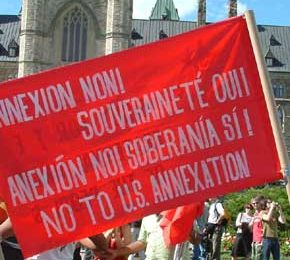 Iranian President Hassan
Rouhani said Trump's remarks
were:
"ignorant, absurd and hateful rhetoric."
Iranian President Hassan
Rouhani said Trump's remarks
were:
"ignorant, absurd and hateful rhetoric."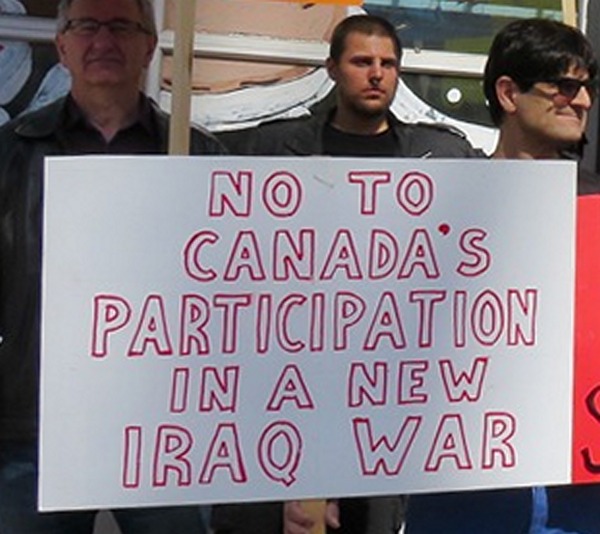 Since September 11, 2001,
Canada has consistently been expanding its foreign military and police
presence in Central and West Asia under U.S. and NATO command. While
openly participating in the invasion of Afghanistan, the
Chrétien Liberal government would not openly participate in the
so-called Coalition of the Willing in 2003, despite having done so
during the
previous U.S. invasions of Iraq. The Trudeau government has now taken
up the challenge to provide an air of legitimacy for Canada's ongoing
military actions in Iraq and their expansion. On June 29, the Trudeau
government announced that its mission in Iraq would be extended for two
more years and that the mission would be "adjusted." This is a far cry
from its election claim that it would end Canada's combat mission in
Iraq, giving the impression that it was against foreign military
escalation. Shortly after being elected, the Trudeau government
launched a new mission in the Middle East, focusing on Iraq and
neighbouring countries such as Jordan and Lebanon.
Since September 11, 2001,
Canada has consistently been expanding its foreign military and police
presence in Central and West Asia under U.S. and NATO command. While
openly participating in the invasion of Afghanistan, the
Chrétien Liberal government would not openly participate in the
so-called Coalition of the Willing in 2003, despite having done so
during the
previous U.S. invasions of Iraq. The Trudeau government has now taken
up the challenge to provide an air of legitimacy for Canada's ongoing
military actions in Iraq and their expansion. On June 29, the Trudeau
government announced that its mission in Iraq would be extended for two
more years and that the mission would be "adjusted." This is a far cry
from its election claim that it would end Canada's combat mission in
Iraq, giving the impression that it was against foreign military
escalation. Shortly after being elected, the Trudeau government
launched a new mission in the Middle East, focusing on Iraq and
neighbouring countries such as Jordan and Lebanon.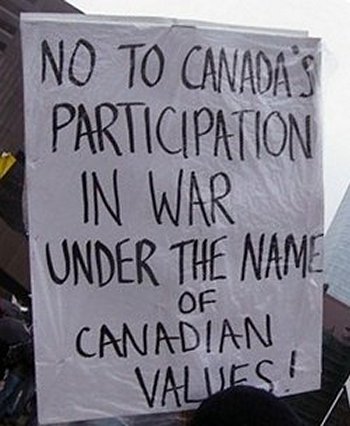 The funding is allegedly to
"assist grass roots women's organizations and assist Jordanian and
Lebanese communities in hosting over 1,660,000 registered Syrian
refugees." Canada has a history of financing various projects to
recruit and use women as a means to meddle in countries' internal
affairs in the name of "empowerment." For example, Canada has been
playing this card for some time by "training" women to participate in
UN-facilitated peace negotiations as part of the anti-Syrian government
opposition forces.[
The funding is allegedly to
"assist grass roots women's organizations and assist Jordanian and
Lebanese communities in hosting over 1,660,000 registered Syrian
refugees." Canada has a history of financing various projects to
recruit and use women as a means to meddle in countries' internal
affairs in the name of "empowerment." For example, Canada has been
playing this card for some time by "training" women to participate in
UN-facilitated peace negotiations as part of the anti-Syrian government
opposition forces.[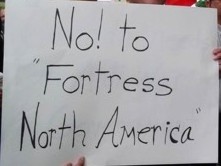
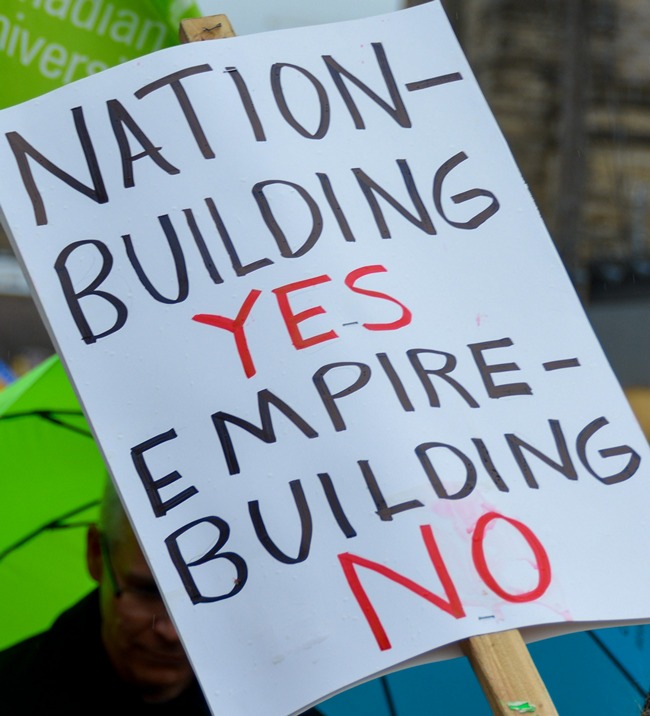
 The role the CLC and some
national unions have given
themselves to lobby for workers' rights within NAFTA serves to
divert attention from the fact that what is being negotiated in
the NAFTA talks is the further integration of Canada and Mexico
into Fortress North America, as a bulwark against workers' rights
and to line up the peoples of all three countries behind U.S.
imperialism's striving for world hegemony. Trade, energy,
communications and security corridors are being put in place
under the control of a new United States of North American
Monopolies and Oligopolies, which act with impunity in North
America and all over the world trampling on the rights of working
people and nation-states.
The role the CLC and some
national unions have given
themselves to lobby for workers' rights within NAFTA serves to
divert attention from the fact that what is being negotiated in
the NAFTA talks is the further integration of Canada and Mexico
into Fortress North America, as a bulwark against workers' rights
and to line up the peoples of all three countries behind U.S.
imperialism's striving for world hegemony. Trade, energy,
communications and security corridors are being put in place
under the control of a new United States of North American
Monopolies and Oligopolies, which act with impunity in North
America and all over the world trampling on the rights of working
people and nation-states.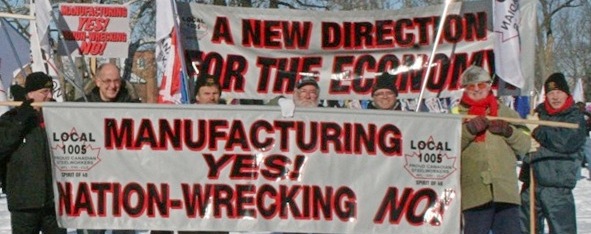
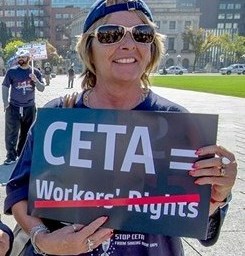
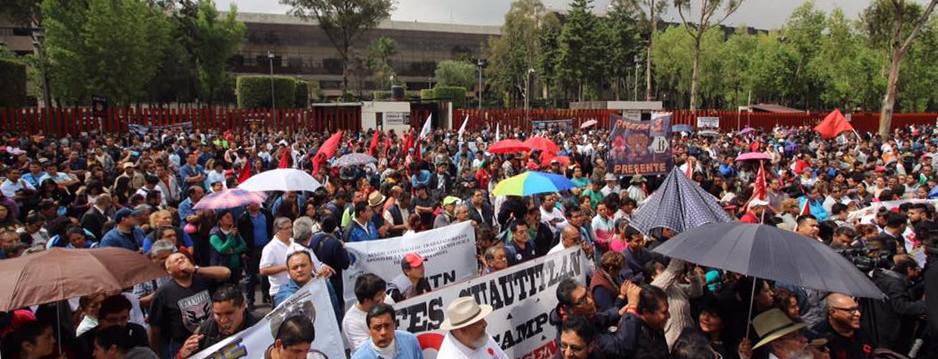
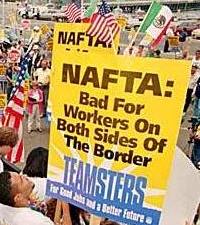
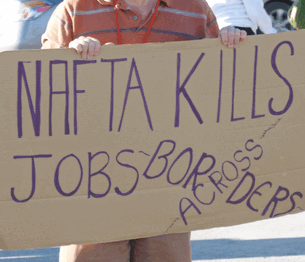 This obscures the
experience the Canadian working people have had with Chapter 11. The
investment component of NAFTA provides a "predictable" and
"rules-based" climate for the monopolies to do as they please at the
expense of the workers, their health and safety and the natural
environment. The decisions of these tribunals and the threat of going
to one are used to attack the right of governments to decide at all
levels and the right of working people to protest and win their
grievances. The tribunals protect the ability of the monopolies to do
as they please while limiting to the slightest degree any intervention
on the part of governments or people to defend their rights.
This obscures the
experience the Canadian working people have had with Chapter 11. The
investment component of NAFTA provides a "predictable" and
"rules-based" climate for the monopolies to do as they please at the
expense of the workers, their health and safety and the natural
environment. The decisions of these tribunals and the threat of going
to one are used to attack the right of governments to decide at all
levels and the right of working people to protest and win their
grievances. The tribunals protect the ability of the monopolies to do
as they please while limiting to the slightest degree any intervention
on the part of governments or people to defend their rights.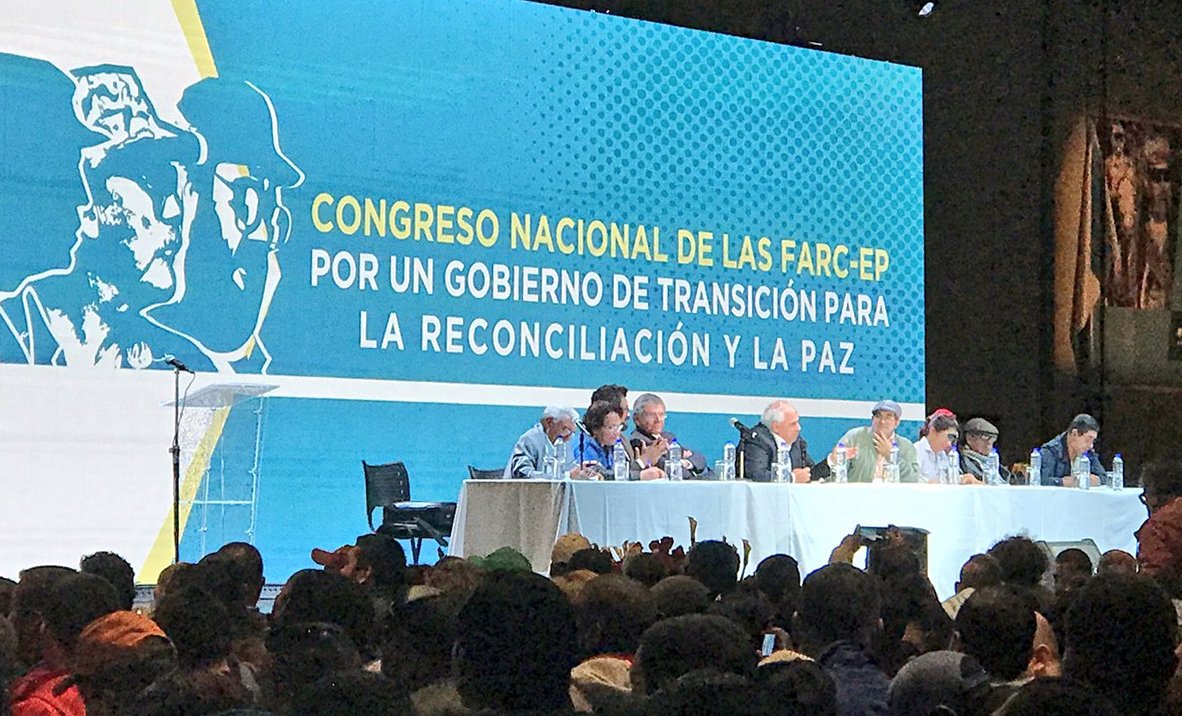

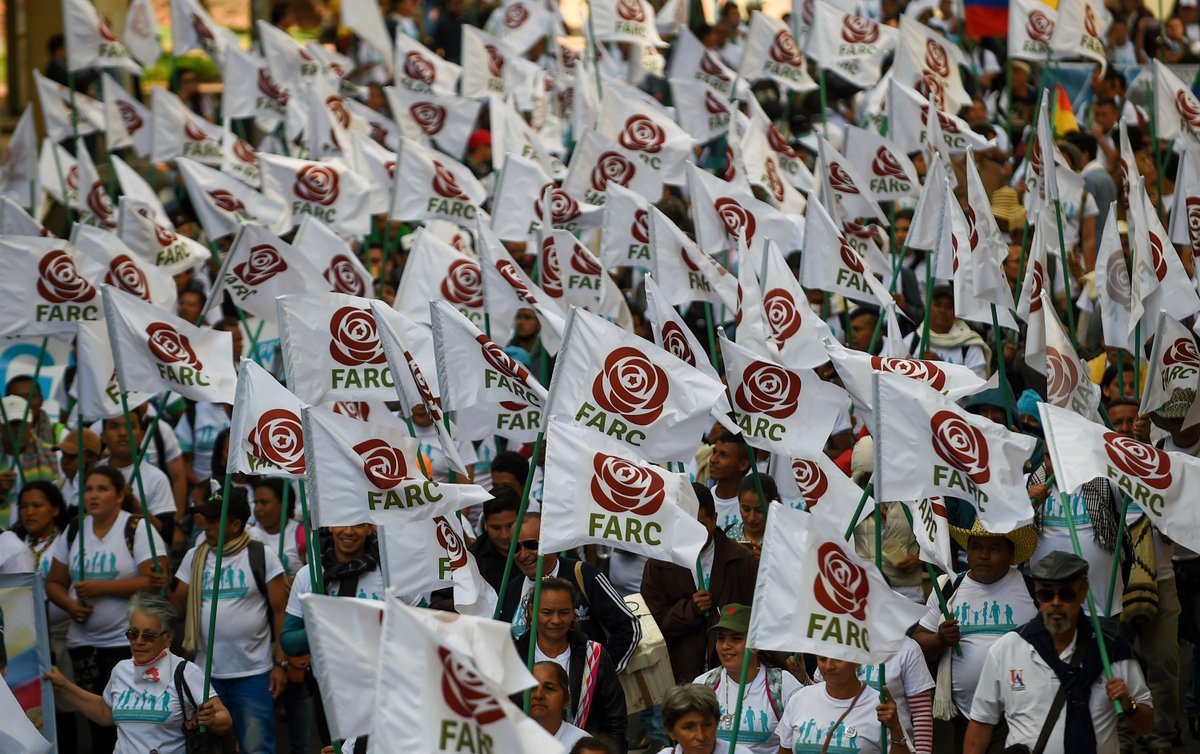

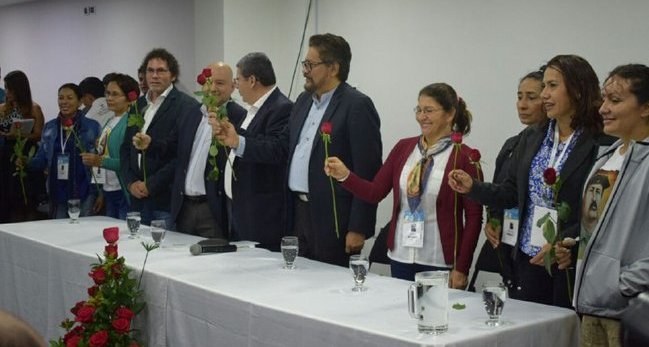

 Among those who lent their
talents and good will to the
celebration was Totó la Momposina, a world-renowned singer and
musicologist from Colombia's Caribbean region whose
performances artfully combine African, Indigenous and Spanish
musical traditions, rhythms and themes.
Among those who lent their
talents and good will to the
celebration was Totó la Momposina, a world-renowned singer and
musicologist from Colombia's Caribbean region whose
performances artfully combine African, Indigenous and Spanish
musical traditions, rhythms and themes. In his speech,
Timoleón Jiménez said, "We want to build a different
country with all of you, a country in which violence disappears once
and for all from the political scene, where no one is persecuted,
assassinated or disappeared for thinking differently. A country in
which no one feels obliged to take up arms to defend their life, where
the response to protest and social non-conformity is not brutality at
the hands of the [riot squad]."
In his speech,
Timoleón Jiménez said, "We want to build a different
country with all of you, a country in which violence disappears once
and for all from the political scene, where no one is persecuted,
assassinated or disappeared for thinking differently. A country in
which no one feels obliged to take up arms to defend their life, where
the response to protest and social non-conformity is not brutality at
the hands of the [riot squad]." 